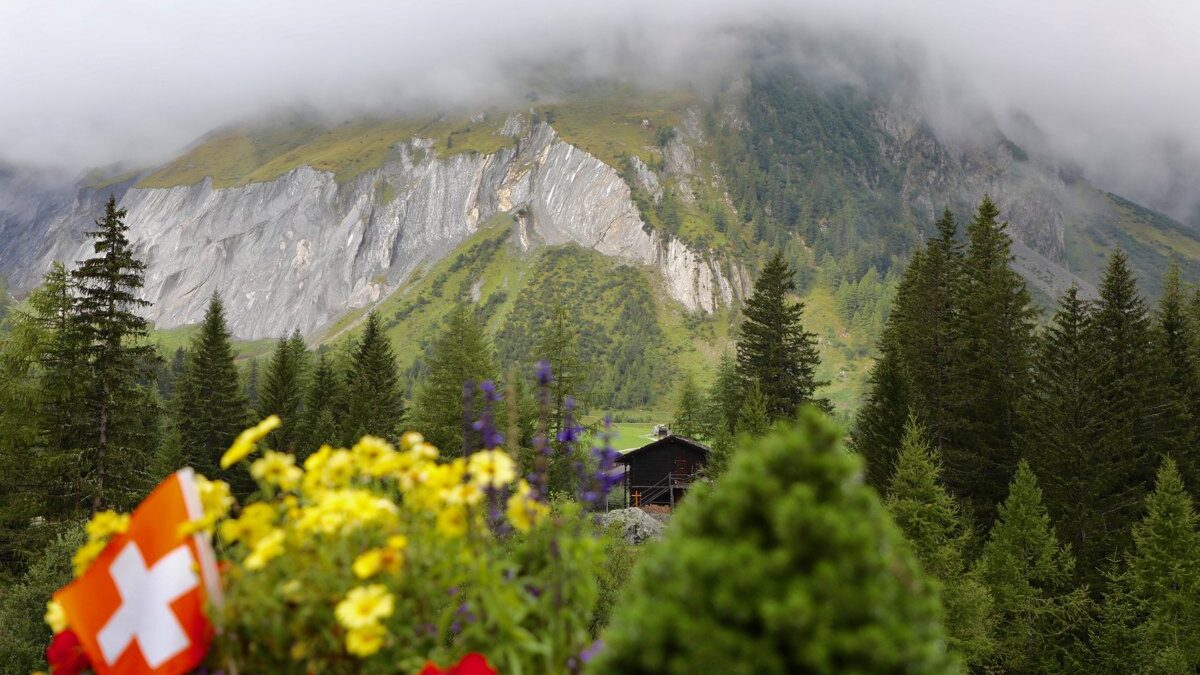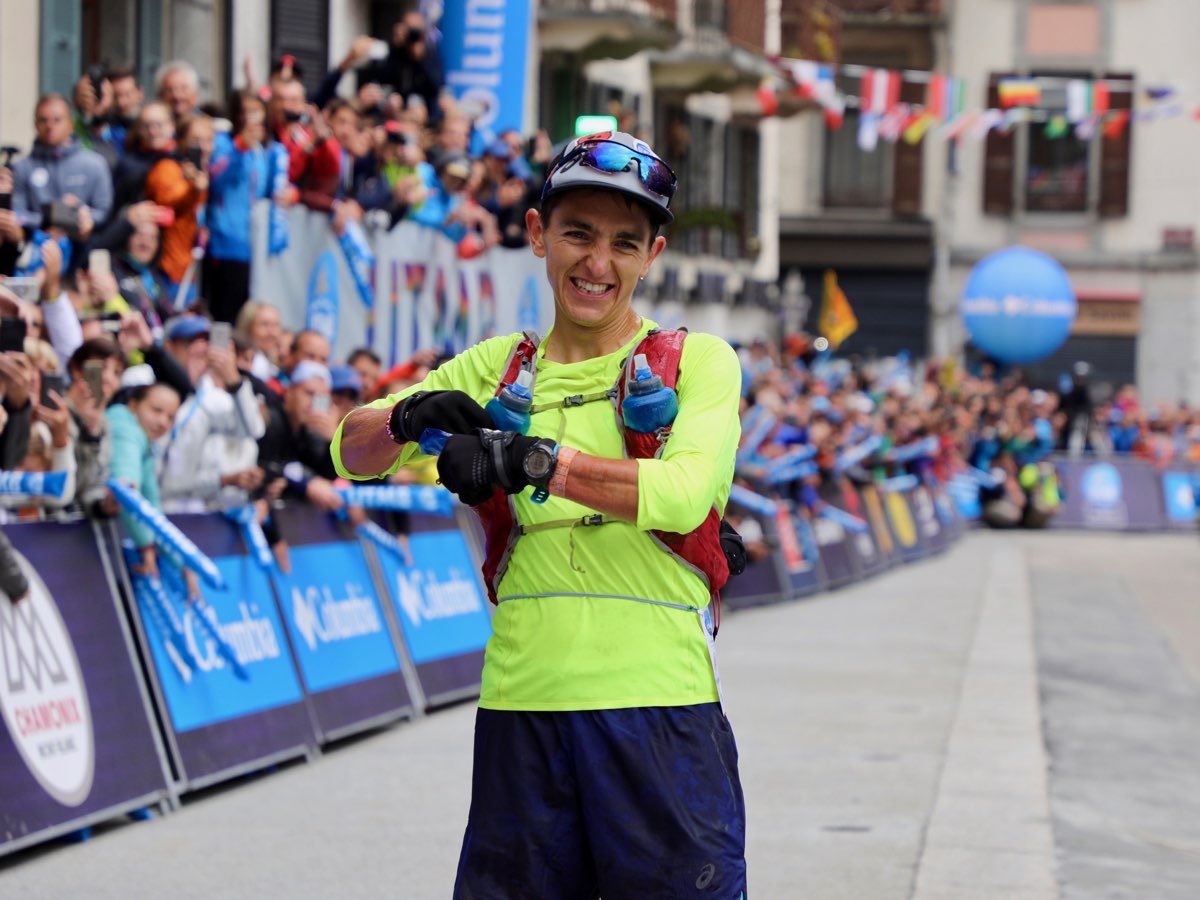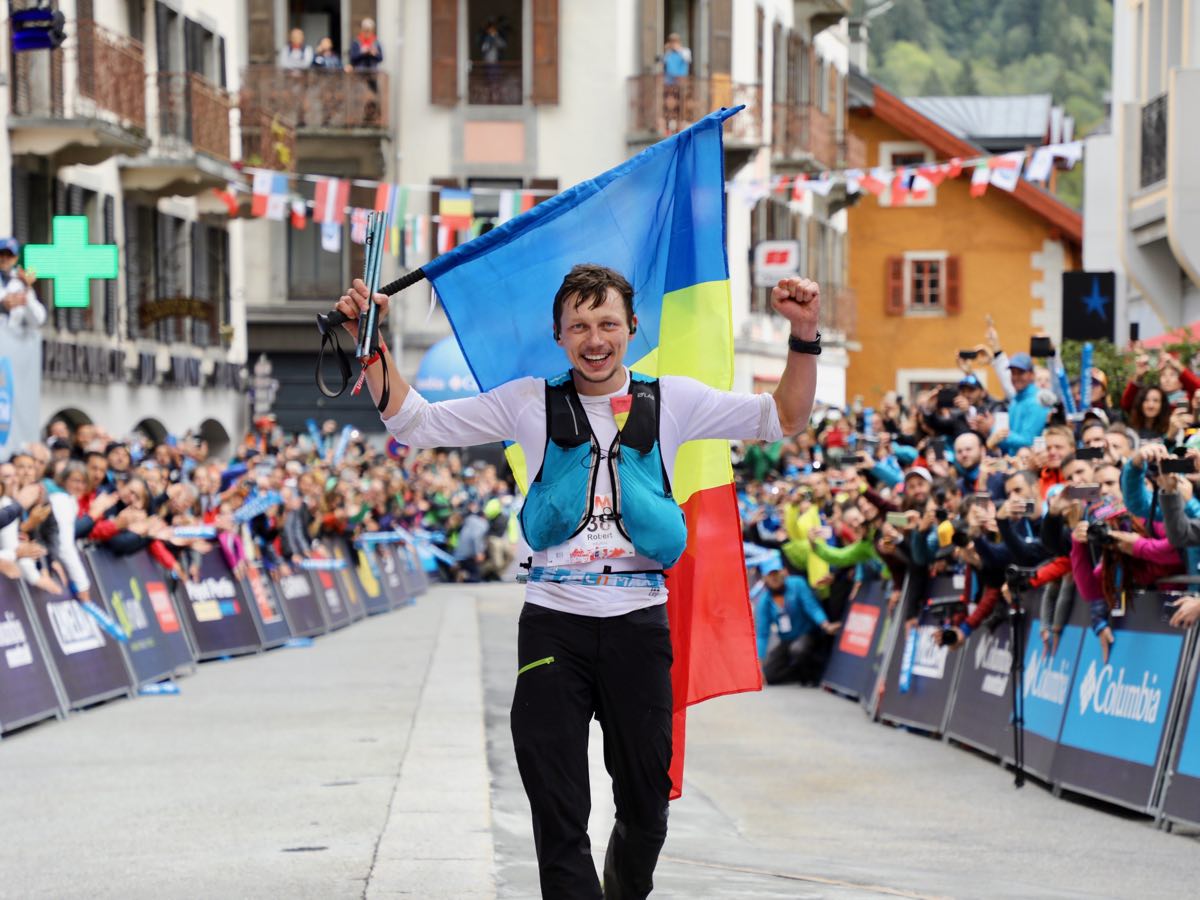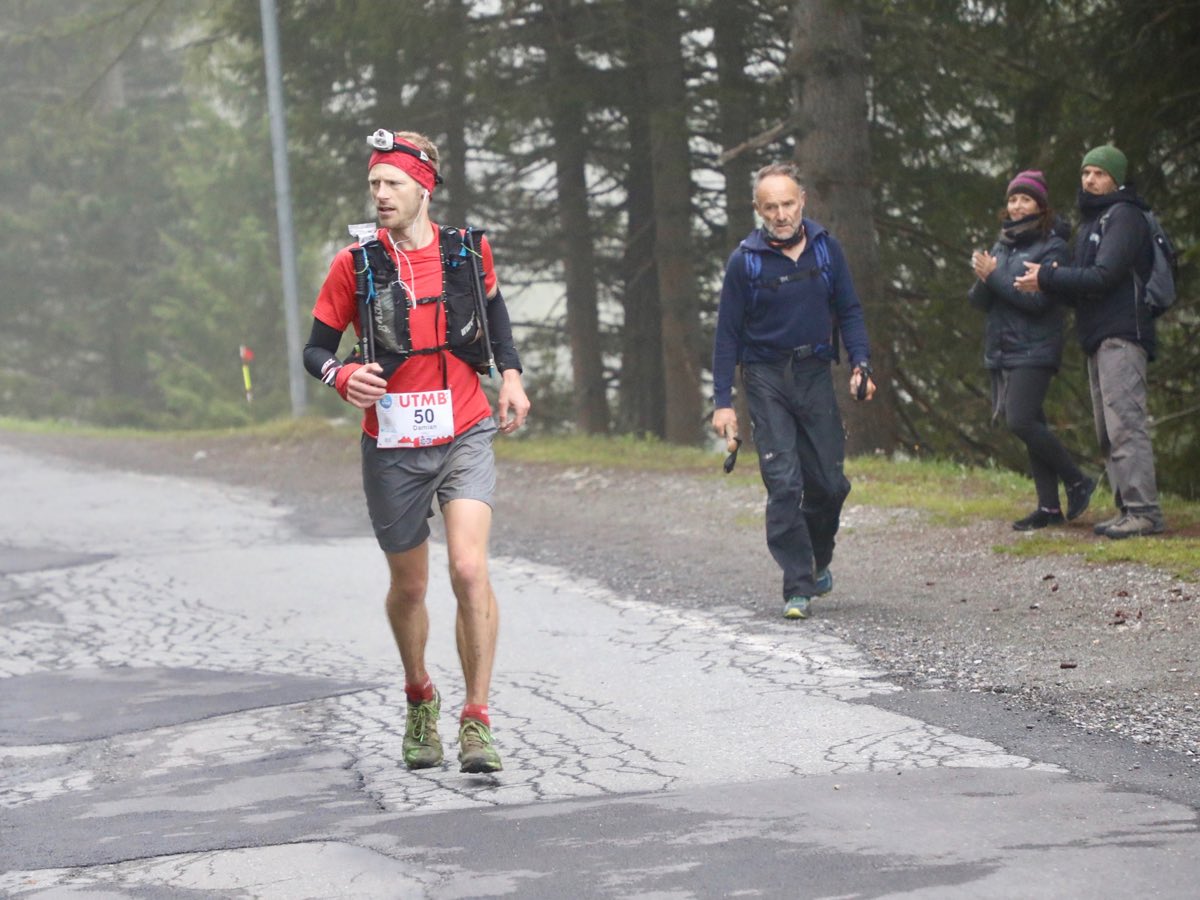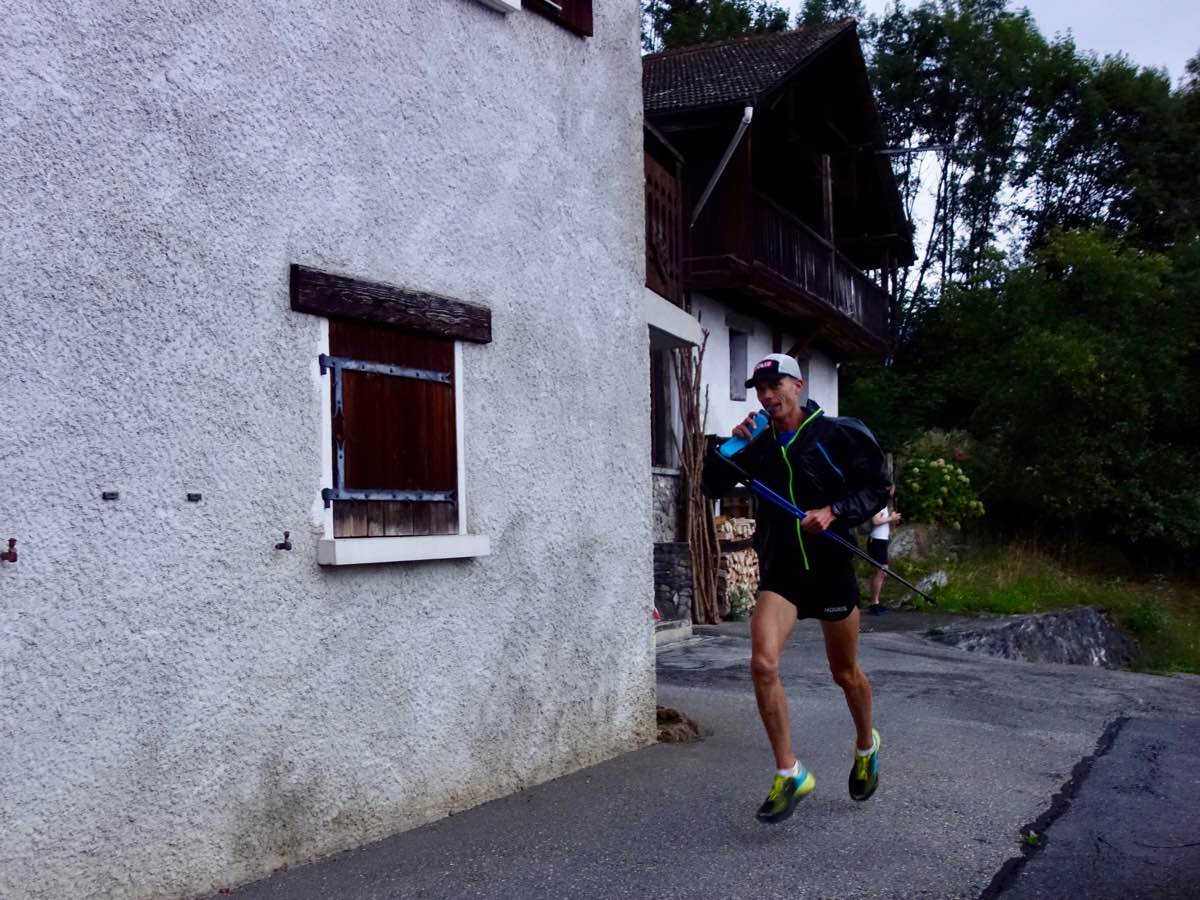 France’s Xavier Thévenard took home his third win while Italy’s Francesca Canepa earned her first victory at UTMB 2018. The men’s and women’s fields faced challenging weather conditions paired with hyper-dynamic competition, which together required not only strong physical performances but perhaps even stronger psychological performances of these champions.
France’s Xavier Thévenard took home his third win while Italy’s Francesca Canepa earned her first victory at UTMB 2018. The men’s and women’s fields faced challenging weather conditions paired with hyper-dynamic competition, which together required not only strong physical performances but perhaps even stronger psychological performances of these champions.
In the men’s race, emergent Romanian runner Robert Hajnal had the race of his life to take second, while Spain’s Jordi Gamito racked up perhaps his biggest performance among a number of big performances over the years to take third. For the women, it was Spain’s Uxue Fraile who returned from major injury to her previous form to take second, and France’s Jocelyne Pauly, who battled long and late in a close women’s podium race for third, her top ultra-trail race result by far.
In a race that was informed in great part by a decimation of the frontrunner field–especially on the men’s side–it was hard to track exactly how many lead shifts happened over the course of the day or so of Alpine trail racing. In our results articles, we typically talk about those who had their best days at the front of the race. With so very many drops among the men’s favorites, a conversation about those who didn’t make it seems warranted, too. First things first, we’ll start at the top of the women’s and men’s fields and, then, work our way down.
A special thanks to Camelbak for making our coverage of UTMB possible!

Thanks also to Jaybird and Altra for their support of our UTMB coverage.
As usual, we’ll be updating this article with additional results as well as links to race-related articles, photo galleries, and race reports. Check back.
To get all the latest ultra news from iRunFar.com, subscribe via RSS or email.
Support iRunFar
Have you enjoyed our in-depth, pre-, during-, and post-race UTMB coverage? Well, you, too, can support iRunFar!
 Please consider becoming a monthly supporter of iRunFar on Patreon or making a one time donation via PayPal in support of our coverage of UTMB. We’ve also got some great products in the new iRunFar Store! Your support helps make iRunFar happen. Thank you!
Please consider becoming a monthly supporter of iRunFar on Patreon or making a one time donation via PayPal in support of our coverage of UTMB. We’ve also got some great products in the new iRunFar Store! Your support helps make iRunFar happen. Thank you!
2018 UTMB Women’s Race
Let’s begin with two important and race-informing facts:
- Last year, there was a spread of three hours and 55 minutes between the first and 10th women. This year, that time difference was about 90 minutes.
- The men’s top-10 time spread was two hours and 45 minutes, and, again, the women’s just 90 minutes.
What a year for the upper-echelon women at UTMB!
Italy’s Francesca Canepa (post-race interview), she’s probably a name that newer fans of international trail ultrarunning don’t recognize. In looking through her decade or so of trail and ultrarunning race results, you might think that on paper she’d reached her ultrarunning peak in the 2012 to 2014 range. For instance, in 2012, she went back-to-back to take second at (one of the weather-shortened versions of) UTMB and, then, win Tor des Géants a couple weeks later. But here we all are in 2018 with a UTMB champ in Francesca.
What we also have in Francesca is a woman who didn’t slow down while surrounded by a field of women who did, and her speed and pace results on the race tracker phenomenally demonstrate this. Her lowest ranking in the overall field was 157th place at Saint-Gervais (21km), and her best was at the finish when she was 33rd overall. Francesca moved inside the women’s top 10 between the descent from Col de la Seigne into Italy (at around 65km) and her hometown of Courmayeur (80km). The rest was history as woman by woman, she passed them all, until she arrived to the 135km checkpoint as the women’s leader. Her gap to the other women was never big–less than five minutes at the finish–but it was plenty for her arrival as the 2018 champ.
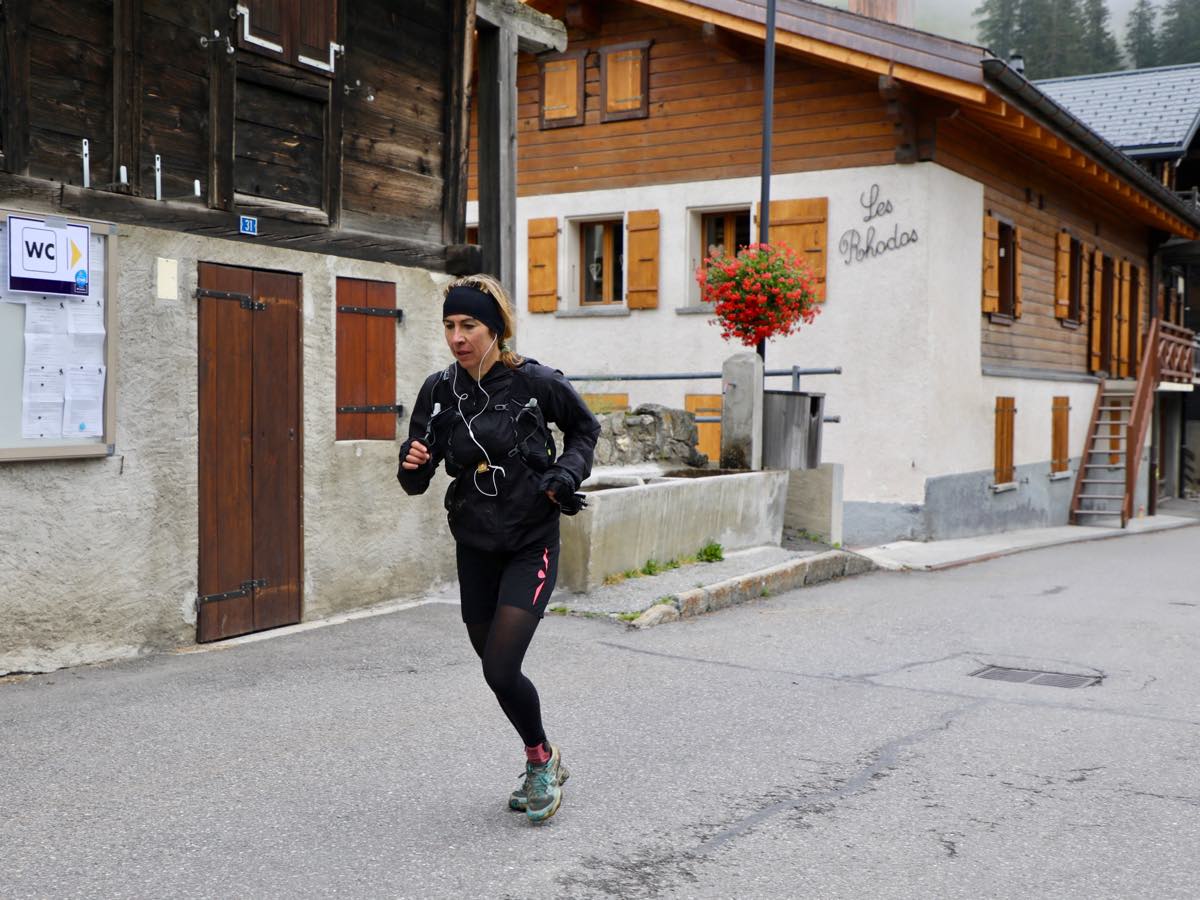
Francesca Canepa at La Fouly in Switzerland at dawn on Saturday, on her way to winning UTMB 2018. Photo: iRunFar/Bryon Powell
I’m not going to lie, Spain’s Uxue Fraile (pre- and post-race interviews) is always a force to be reckoned with. But she’d been injured for a long time, so going into this year’s UTMB, I was unsure if she’d be back to her previous form. When I caught a glimpse of her in Chamonix a couple days before the race, I was sure she’d compete for the podium. Holy smokes, was she fit!
Early race, Uxue was smack dab in the middle of the women’s top 10, in fifth at 21km. From there until about 124km, Uxue’s position in the women’s top five shifted around. At Les Chapieux (50km), she was second, while at Grand Col Ferret (90km), she was fourth. This was the result of women coming and going from in front of her, time and again. She would say after the race that the fluidity with which women moved in front of and, then, behind her was actually sort of confusing, in terms of the sheer number of times it happened and who those runners were. By 140km, she settled into second place, where she would stay. Ultimately, she caused a little excitement as she cut over half her deficit to the lead in a couple kilometers over the race’s final 10km, on the steep descent to Chamonix from La Flégère. But when the route flattened out again with a couple kilometers to go, her pace evened out relative to that of Francesca in front of her, and the pair finished about 4.5 minutes apart.
Third-place Jocelyne Pauly (post-race interview) of France was this year’s women’s breakout runner. She’s been a strong ultrarunner for a number of years, but this was far and away her strongest result–by a country (or Alpine?!) mile. A mom and an educator living in the French Pyrenees, Jocelyne was unaffected by the difficult weather conditions which persisted for most of the first 12 hours of the race, including rain, frozen precipitation, and cold temperatures. As early as 21km into the race, Jocelyne was well inside the top 10. She said after the race that this positioning surprised her, but that she went with it since it felt good. She was still outside podium position at the start of the final climb, and once she moved her way into third place, she said that her competitive instinct made her want to fight for that spot.
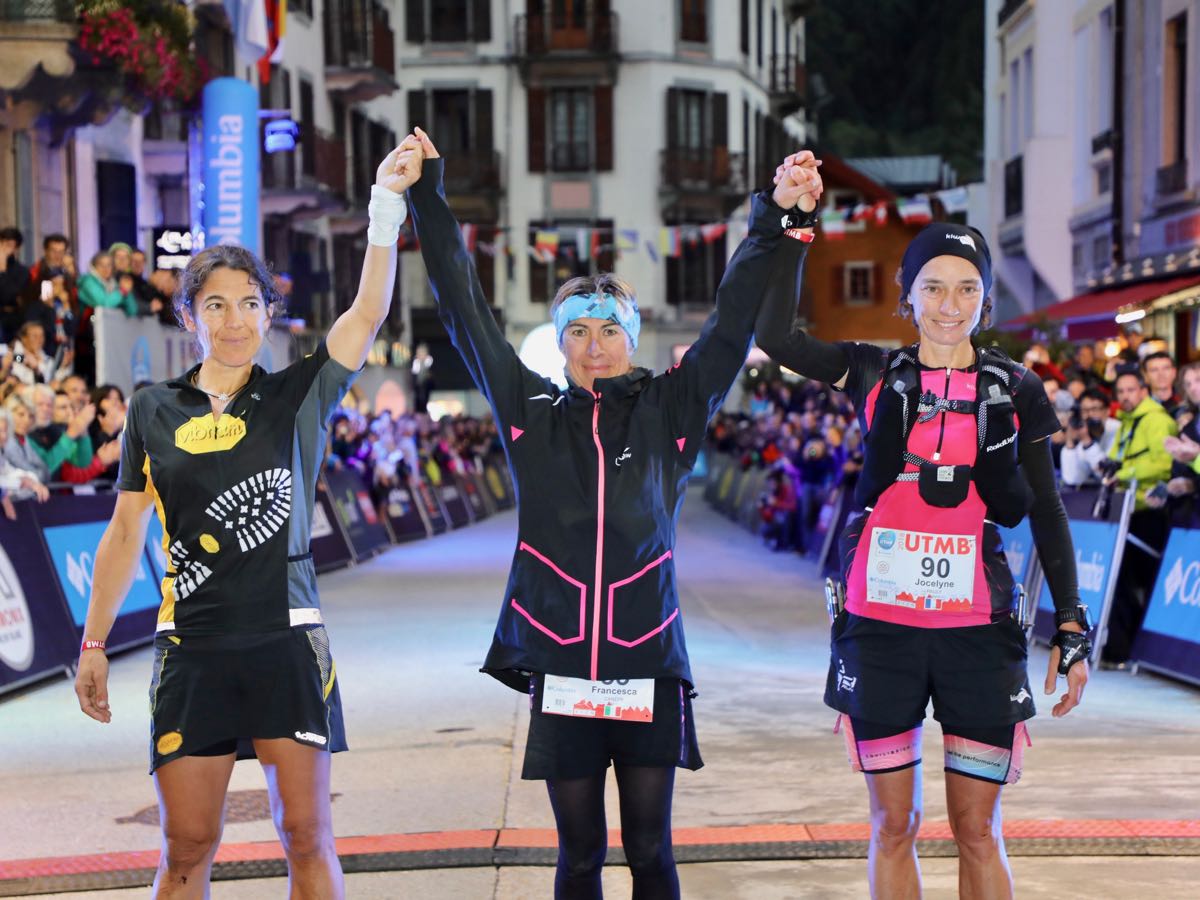
The women’s podium of UTMB 2018 (l-to-r): 2. Uxue Fraile, 1. Francesca Canepa, 3. Jocelyne Pauly. Photo: iRunFar/Bryon Powell
Fourth place was the U.K.’s Beth Pascall, who put on what looks like a textbook performance, running outside the women’s top 10 to start, easing into it mid-race, before coming on strong in the final 25km to move up from seventh to fourth place.
Rounding out the women’s top five was Italy’s Katia Fori, who was one of those people whose position in the race moved around, from higher, to lower, to higher, and to lower again. At one point she was actually leading the race before she ultimately finished fifth.
In sixth was France’s Juliette Blanchet, who avenged last year’s DNF with a strong 2018 finish. Seventh place was the always-impressive Ildikó Wermescher (post-race interview) of Hungary. The USA’s Cat Bradley took eighth. Bulgaria’s Mariya Nikolova (pre-race interview) took ninth for the second year in a row. The USA’s Kaci Lickteig, who sat outside the women’s top 10 until the final kilometers, sprinted it in for 10th place.
Drops were an influential part of the storyline of both the women’s and men’s races, though as we shall see below, the DNF influence was really heavy among the men. iRunFar had 34 women in its preview who actually ended up starting the race, and I believe that 12 of them didn’t finish, a 35% drop rate. There were 782 DNFs among 2,561 total starters, a 31% overall drop rate. So the frontrunner women’s DNF rate was a little higher than the average drop rate for the whole field. Interestingly, seven of those 12 women were from the USA.
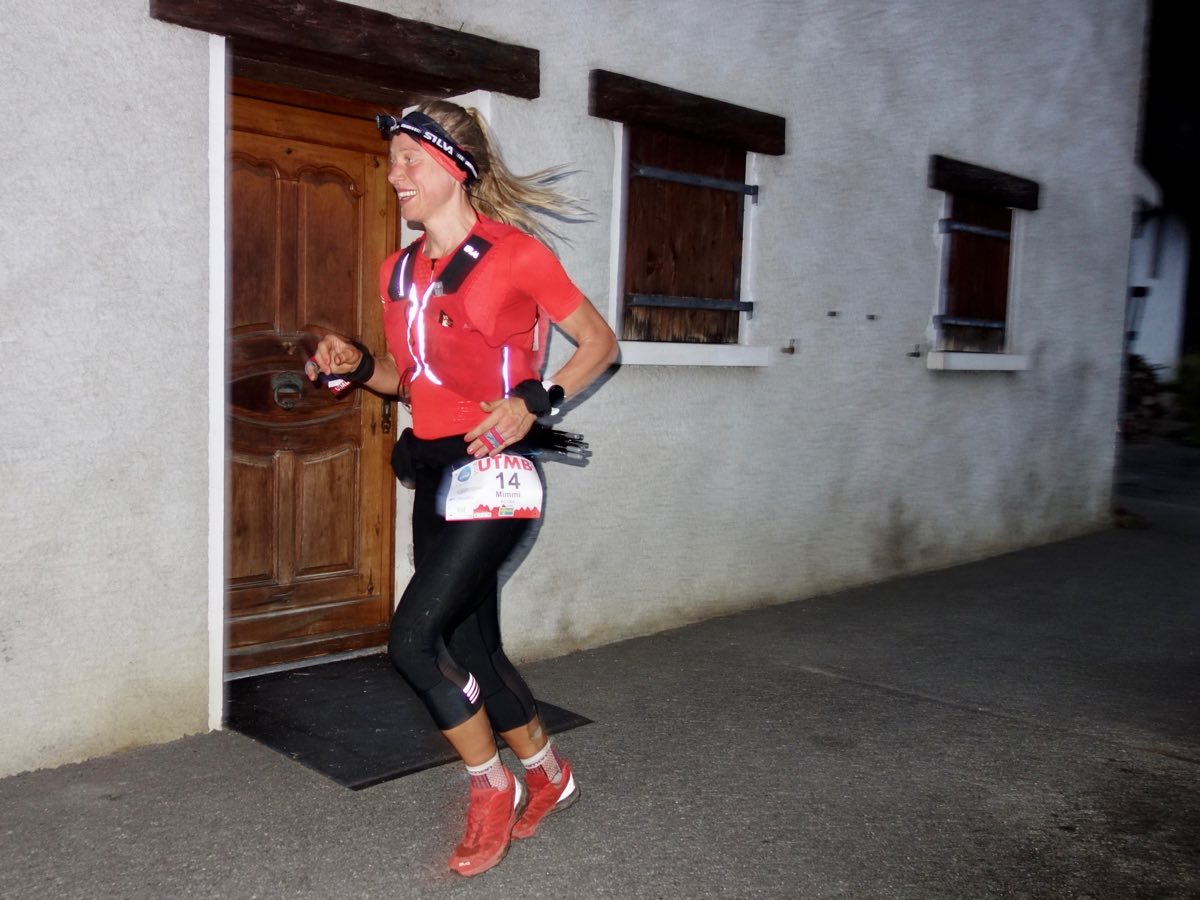
Mimmi Kotka was one of the women’s favorites, but she dropped in Les Contamines, early in the race. Photo: iRunFar/Meghan Hicks
2018 UTMB Women’s Results
- Francesca Canepa (UGlow) –26:03:48 (post-race interview)
- Uxue Fraile (Vibram) –26:08:07 (pre- and post-race interviews)
- Jocelyne Pauly (Kiwami)– 26:15:11 (post-race interview)
- Beth Pascall (Raidlight) – 26:26:40
- Katia Fori (Columbia) – 26:40:43
- Juliette Blanchet (Vibram) – 26:48:44
- Ildikó Wermescher (Hoka One One) – 27:19:36 (post-race interview)
- Cat Bradley (Salomon) –27:22:11
- Mariya Nikolova – 27:23:20 (pre-race interview)
- Kaci Lickteig (Altra) – 27:31:39
- Fernanda Maciel (The North Face) – 27:35:11
- Sophie Grant – 27:51:07
- Emilie Lecomte – 28:10:03 (pre-race interview)
- Nathalie Henriques – 28:38:57
- Teresa Nimes (Compressport) – 28:50:12
- Kaori Niwa (Salomon) – 28:52:10
- Irene Kinnegim (Raidlight) – 29:16:34
- Manu Vilaseca (BUFF) – 29:28:05
- Jo Meek (SCOTT) – 30:16:38
- Fu-Zhao Xiang (Toread) – 31:29:47
2018 UTMB Men’s Race
To be honest, I think a number of us wondered about Xavier Thévenard’s (pre- and post- race interviews) ability to recover from both those 91 miles of the Hardrock 100 that he did run as well as the psychological outwash of the nine miles he didn’t with his disqualification a scant six weeks ago. But if there was any lingering fatigue, you couldn’t see it. He was solid all day long, not only efficient in his trail time, but also efficient in his aid-station transitions. And he also kept his cool as lead change after lead change happened around him until there was just him left. Sometimes it’s hard to tell if Xavier enjoys what he does when he’s out there–he’s a quiet guy who keeps his thoughts to himself and the emotions off his face. But he let his feelings out at the finish with a sweet celebration.
At the outset and for something like half the race, Xavier sat in the middle of the top 10. Then, from about midway up until the 50-kilometers-to-go mark, he moved up until he eventually was the solo race leader starting at Champex-Lac (124km). His lead was modest at first, but he really opened it up in the final race segments, ultimately winning by some 45 minutes.
Second-place Robert Hajnal (post-race interview), of Romania… wait, stop the ‘press.’ Who’s that? I know, I know, iRunFar has a small yet passionate collection of Romanian readers who did know of this guy before this weekend, but the rest of us, let’s get to know Robert. I took notice of him when he finished 15th at the 2018 Trail World Championships, but his accolades go farther back than that. Last year, he earned a pair of fifth places at the Lavaredo Ultra Trail and Ultra-Trail Cape Town.
The first time Robert caught my attention at this race was in the dark, cold, wind, and below-freezing temperatures on the descent from Col de la Seigne on the border of France and Italy, at about 65km. He was bundled up enough that it was hard to figure out who he was while he ran just outside of the men’s top 10. The next time we saw him in the bustling Courmayeur aid station (80km), he’d passed a bunch of people and moved solidly into the lead group. That’s where he stayed all day, moving up sequentially until, after 124km, he found his ultimate finishing position. Our eyes are squarely on you now, Robert. What’s your next move?
Spain’s Jordi Gamito (post-race interview) has a lot of feathers of success adorning his trail-ultrarunning hat from the last half-decade-plus of high-level ultrarunning. I believe he had two previous finishes of 12th and 10th places at UTMB to his name, as well as podium finishes at other important races. At the finish line, Jordi said that earning a UTMB podium position was like a dream to him, something he’d thought a lot about, but thought he might never achieve. Well, Jordi, dreams do come true! Like Xavier and Robert in front of him, Jordi started out a little conservatively, and got closer to the front of the race as time went on. He found his third-place position with about 60km to go, and he never was closely challenged for it, nor did he challenge for a higher ranking. This year, the podium is his.
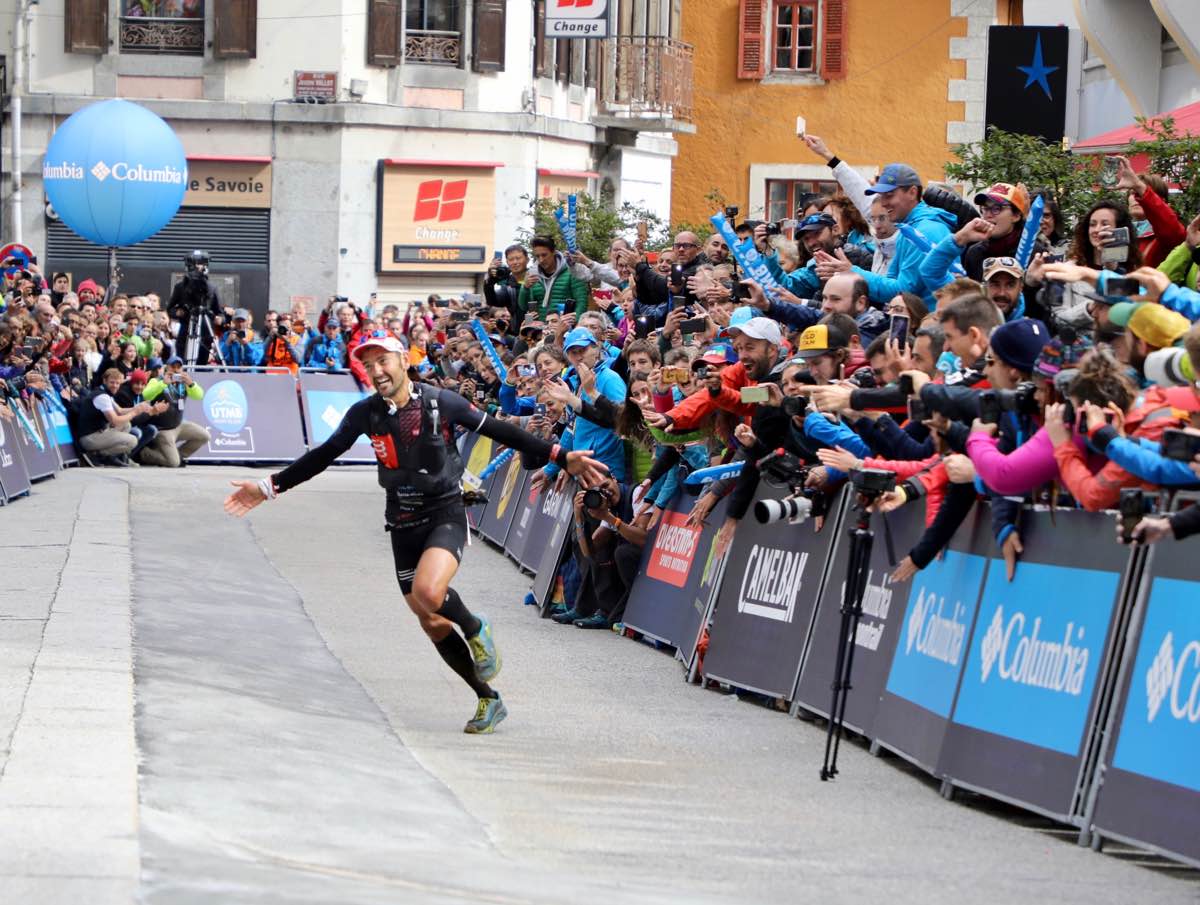
Jordi Gamito celebrates his third place with the crowd gathered at the UTMB 2018 finish line. Photo: iRunFar/Bryon Powell
Here we go, Norway’s Hallvard Schjølberg, who are you? He’s the dude who took 28th place at UTMB last year and fourth place this year. Talk about some improvement! Hallvard was a quintessential honey badger, never really caring about or being bothered by difficult conditions, soldiering on in it all.
Rounding out the men’s top five was the U.K.’s Damian Hall (post-race interview). Check out his UTMB progression: 29th in 2015, 19th in 2016, 12th last year, and, now, this. With such significant leaps forward, the only question is what his UTMB ceiling might be.
Sixth place was Latvian Roman Evarts, who turned up in the men’s top 10 at 124km, after running over half the race in 20th-30th place overall. Seventh was Italy’s Stefano Ruzza, who employed the same move-up strategy, though not entering the top 10 until even later. Erik Clavery, of France, surprised me. I tend to think of him as a relatively aggressive runner who sometimes sticks it and sometimes doesn’t. I was, thus, surprised to see him taking it easier early and running around 20th place before watching him turn up in the top 10 later in the race. Austria’s Florian Grasel finished ninth, and Spain’s Javi Dominguez took 10th.
To put it mildly, there were some DNFs in the men’s field. At quick count, it looks like there were 25 drops from the 39 men in our preview who ultimately started the race, or a 64% drop rate among iRunFar’s men’s favorites. This statistic sits in stark contrast to the race’s overall drop rate of 31%. Some of those drops were the result of weird stuff, like a pre-race bee sting that manifested in mid-race health issues for three-time champion Kilian Jornet, as well as during-race slips, trips, and ankle rolls that created race-ending injuries for Tim Tollefson (pre-race interview) who’s taken third at UTMB twice, previous second-place-finisher Luis Alberto Hernando (pre-race interview), and Alex Nichols who was debuting at UTMB but who has a plenty-strong racing resume. This is a significant number, sure, but there’s still much more to the story, and that has to be the general wear and tear of running 100 miles in difficult weather conditions catching up with a lot of men, including two-time top-10er Zach Miller (pre-race interview) who I also think hurt his ankle after going into the energetic hurt bucket, Jim Walmsley (pre-race interview) who was fifth last year, three-time top-10er Gediminus Grinius, Scotty Hawker who was last year’s 11th-place finisher, and more.
2018 UTMB Men’s Results
- Xavier Thévenard (asics) – 20:44:16 (pre- and post- race interviews)
- Robert Hajnal (CEP) – 21:31:37 (post-race interview)
- Jordi Gamito (Compressport) – 21:57:01 (post-race interview)
- Hallvard Schjølberg (inov-8) – 22:06:59
- Damian Hall (inov-8) – 22:35:13 (post-race interview)
- Roman Evarts – 22:38:29
- Stefano Ruzza (Vibram) – 23:02:19
- Erik Clavery – 23:07:53
- Florian Grasel (BOA) – 23:12:03
- Javi Dominguez (Vibram) – 23:27:08
- Petter Restorp – 23:34:35
- Christopher Hammes – 23:47:39
- Mathieu Blanchard (Salomon) – 23:53:02
- Sacha Devillaz – 23:59:55
- Jim Mann – 24:07:27
- Emir Grairi – 24:16:21
- Gregoire Curmer (Compressport) – 24:26:59
- Matthieu Bosquet – 24:27:00
- Roberto Mastrotto (La Sportiva) – 24:28:23
- Bertrand Collomb-Patton – 24:33:26
2018 UTMB Articles, Race Reports, and More
Coverage Thanks
It takes a village! Thank you so much to our office and field teams for forgoing sleep, putting in hundreds of miles of driving and hiking to report from remote locations, standing on frozen mountainsides for hours on end, and staring at computers all night and day. We are so grateful to Kirsten Kortebein, Marissa Harris, Mauri Pagliacci, Casey Szesze, Tim Peeters, Kate Cooke, Eóin Lennon, Gaël Revelin, Fabrice Van De Cauter, Tom Van De Cauter, Antonio Gassi, Rebecca Gassi, Cass Chisholm, Fabrizio Lavuri, Martina Demateo, Amy Leedham, and Braden Engel!
